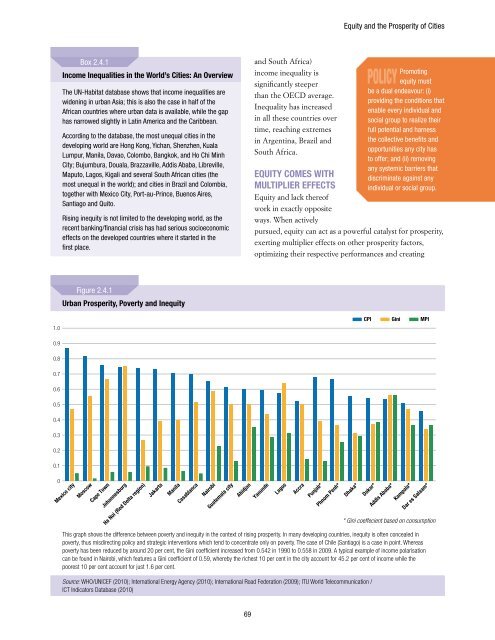Equity and <strong>the</strong> Prosperity <strong>of</strong> CitiesBox 2.4.1Income Inequalities in <strong>the</strong> World’s Cities: An OverviewThe UN-Habitat database shows that income inequalities arewidening in urban Asia; this is also <strong>the</strong> case in half <strong>of</strong> <strong>the</strong>African countries where urban data is available, while <strong>the</strong> gaphas narrowed slightly in Latin America and <strong>the</strong> Caribbean.According to <strong>the</strong> database, <strong>the</strong> most unequal <strong>cities</strong> in <strong>the</strong>developing world are Hong Kong, Yichan, Shenzhen, KualaLumpur, Manila, Davao, Colombo, Bangkok, and Ho Chi MinhCity; Bujumbura, Douala, Brazzaville, Addis Ababa, Libreville,Maputo, Lagos, Kigali and several South African <strong>cities</strong> (<strong>the</strong>most unequal in <strong>the</strong> world); and <strong>cities</strong> in Brazil and Colombia,toge<strong>the</strong>r with Mexico City, Port-au-Prince, Buenos Aires,Santiago and Quito.Rising inequity is not limited to <strong>the</strong> developing world, as <strong>the</strong>recent banking/financial crisis has had serious socioeconomiceffects on <strong>the</strong> developed countries where it started in <strong>the</strong>first place.and South Africa)income inequality issignificantly steeperthan <strong>the</strong> OECD average.Inequality has increasedin all <strong>the</strong>se countries overtime, reaching extremesin Argentina, Brazil andSouth Africa.Equity comes withmultiplier effectsEquity and lack <strong>the</strong>re<strong>of</strong>policy Promotingequity mustbe a dual endeavour: (i)providing <strong>the</strong> conditions thatenable every individual andsocial group to realize <strong>the</strong>irfull potential and harness<strong>the</strong> collective benefits andopportunities any city hasto <strong>of</strong>fer; and (ii) removingany systemic barriers thatdiscriminate against anyindividual or social group.work in exactly oppositeways. When activelypursued, equity can act as a powerful catalyst for prosperity,exerting multiplier effects on o<strong>the</strong>r prosperity factors,optimizing <strong>the</strong>ir respective performances and creatingFigure 2.4.1Urban Prosperity, Poverty and Inequity1.0CPI Gini MPI0.90.80.70.60.50.40.30.20.10Mexico cityMoscowCape TownJohannesburgHa Noi (Red Delta region)JakartaManilaCasablancaNairobiGuatemala cityAbidjanYaoundeLagosAccraPunjab*Phnom Penh*Dhaka*Dakar*Addis Ababa*Kampala*Dar es Salaam** Gini coeffecient based on consumptionThis graph shows <strong>the</strong> difference between poverty and inequity in <strong>the</strong> context <strong>of</strong> rising prosperity. In many developing countries, inequity is <strong>of</strong>ten concealed inpoverty, thus misdirecting policy and strategic interventions which tend to concentrate only on poverty. The case <strong>of</strong> Chile (Santiago) is a case in point. Whereaspoverty has been reduced by around 20 per cent, <strong>the</strong> Gini coefficient increased from 0.542 in 1990 to 0.558 in 2009. A typical example <strong>of</strong> income polarisationcan be found in Nairobi, which features a Gini coefficient <strong>of</strong> 0.59, whereby <strong>the</strong> richest 10 per cent in <strong>the</strong> city account for 45.2 per cent <strong>of</strong> income while <strong>the</strong>poorest 10 per cent account for just 1.6 per cent.Source: WHO/UNICEF (2010); International Energy Agency (2010); International Road Federation (2009); ITU World Telecommunication /ICT Indicators Database (2010)69
State <strong>of</strong> <strong>the</strong> World’s Cities <strong>2012</strong>/<strong>2013</strong>linkages among <strong>the</strong>m.When equity Its absence will willpolicy is embedded have <strong>the</strong> reverse effect,in urban developmentcompounding any existingstrategies, efficiency isenhanced, asset utilizationbiases, or dysfunctionsbecomes optimal,already hinderingproductivity improves, social prosperity.cohesion is streng<strong>the</strong>ned,Undoubtedly, someand both sustainability and <strong>cities</strong> have demonstrated aresilience are enhanced.capacity to stimulate growthand prosperity even in <strong>the</strong>absence <strong>of</strong> equity. However,as has become amply evident in <strong>the</strong> past three decades,such prosperity, coupled with uneven distribution, remainsnarrowly confined and is unsustainable. Conversely, <strong>cities</strong>that have built equity into <strong>the</strong>ir local development strategiesare better placed for enhanced prosperity.Equity reduces alienation and exclusion, paving <strong>the</strong>way for empowerment and engagement <strong>of</strong> all social groups,and for <strong>the</strong> realization <strong>of</strong> <strong>the</strong> full potential <strong>of</strong> <strong>the</strong> entirepopulation. Indeed, <strong>cities</strong> that have removed impedimentsto <strong>the</strong> full engagement <strong>of</strong> women, youths and even <strong>the</strong>elderly have invariably enhanced overall prosperity.Equity is not simply a normative concern, related toissues <strong>of</strong> fairness and justice, important as <strong>the</strong>se may be. It isa material factor which directly impinges on <strong>the</strong> process <strong>of</strong>social and material sustenance. In fact, through removal <strong>of</strong>‘unfreedoms’, and with <strong>the</strong> attendant broadening <strong>of</strong> choicesand opportunities, equity enhances <strong>the</strong> city’s transformativecapacity while also promoting identity and agency among<strong>the</strong> population.The social process that comes with <strong>the</strong> opportunitiesmade available to all through public goods like qualityeducation and skills, enables <strong>the</strong> population to remainengaged and to stake a claim on <strong>the</strong> city. In this respect, <strong>the</strong>way a city shapes, and is in turn shaped by, its population,will largely depend on whe<strong>the</strong>r urban systems provide allresidents with equal opportunities for development and <strong>the</strong>ability to exert agency.Inequity is inefficient from an economic perspective. Asstressed by Sen, “<strong>the</strong> primitiveness <strong>of</strong> social developments(such as widespread illiteracy, malnutrition, lack <strong>of</strong> healthfacilities and medical networks) is a barrier to <strong>the</strong> fullrealisation <strong>of</strong> <strong>the</strong> benefits <strong>of</strong> participatory growth andBox 2.4.2Spatial divisions exacerbate inequalitySpatial inequalities are not only a forerunner <strong>of</strong> social andeconomic divisions; <strong>the</strong>se in turn cause fur<strong>the</strong>r inequalities anddifferent forms <strong>of</strong> exclusion and marginalization. In Jordan’scapital, for instance, 97 per cent <strong>of</strong> households in WesternAmman have computers while in Eastern Amman <strong>the</strong> proportionis no more than eight per cent. Not surprisingly, in WesternAmman more than 50 per cent <strong>of</strong> males and 20 per cent <strong>of</strong>females earn more than USD1,400 monthly, compared with onlytwo per cent for males and less than one per cent for females inEastern Amman. 7The urban divide appears to widen with higher degrees <strong>of</strong>economic prosperity; at least this is <strong>the</strong> perception <strong>of</strong> populationsand local experts. In Bangalore, where specialisation in computertechnologies has brought a fair amount <strong>of</strong> economic prosperity,a local expert remarked that “while quality <strong>of</strong> life is comfortablefor ‘elite Bangalore’, it is not so for <strong>the</strong> ‘o<strong>the</strong>r Bangalore’ whichcomprises <strong>the</strong> majority <strong>of</strong> <strong>the</strong> population”. 8 In São Paulo, evenas municipal authorities strive to integrate favelas, informalsettlements and rehabilitated urban neighbourhoods into a moreinclusive city, wealthy Paulistanos resist <strong>the</strong> process and gravitateto more exclusive enclaves. The result is what has been dubbeda ‘city <strong>of</strong> walls’ where any visible prosperity appears to be largelymonopolised by <strong>the</strong> wealthy. In Lusaka, a local expert reportsthat ”increasing degrees <strong>of</strong> exclusion are reappearing in <strong>the</strong>city, especially with <strong>the</strong> new infrastructure under development.Segregation along racial lines is re-emerging.” 9 In Dubai, as insome o<strong>the</strong>r Gulf <strong>cities</strong>, <strong>the</strong> gap between nationals and nonnationals(access to schooling, public hospitals, health insurance,adequate and affordable housing, labour grievances and rights) isunequal in <strong>the</strong> extreme.Research shows that when combined, <strong>the</strong> physical and socialdivisions between rich and poor neighbourhoods can generatefur<strong>the</strong>r exclusion and marginalization, especially when <strong>the</strong>poor are confined to far<strong>the</strong>r neighbourhoods with inadequateaccessibility. The underprivileged people living in <strong>the</strong>se ‘lost’areas suffer from a triple jeopardy: long distances, high transportcosts and excessive commuting times. This turns into a genuine“spatial poverty trap” that conspires against shared prosperitythrough restrictions on jobs, compounding gender differences,limiting social interactions and reducing social capital, increasing<strong>the</strong> likelihood <strong>of</strong> crime and violence, with worsening livingstandards as a result. 10 The spatial inequalities so visible inso many <strong>cities</strong> are also <strong>the</strong> outcome <strong>of</strong> broader and deeplyentrenched processes <strong>of</strong> unplanned urban development, poorgovernance and institutionalized exclusion and marginalisation <strong>of</strong>specific groups.70





